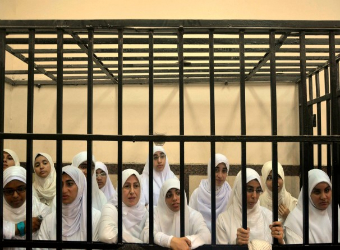Nearly two dozen Islamist women and girls, some as young as 15, were handed heavy prison sentences Wednesday for protesting in a court ruling that came a day after police beat and terrorized prominent female activists in a crackdown on secular demonstrators under a tough new anti-protest law.
The harshness of the sentences and the scenes a day earlier were new signs that the military-backed government is becoming bolder in silencing dissent, turning to abuses reminiscent of the Hosni Mubarak era. Authorities have been justifying tougher measures as needed to fight terrorism and bring stability — while they also appear to be exploiting divisions among secular democracy activists.
Nearly two dozen Islamist women and girls, some as young as 15, were handed heavy prison sentences Wednesday for protesting in a court ruling that came a day after police beat and terrorized prominent female activists in a crackdown on secular demonstrators under a tough new anti-protest law.
The harshness of the sentences and the scenes a day earlier were new signs that the military-backed government is becoming bolder in silencing dissent, turning to abuses reminiscent of the Hosni Mubarak era. Authorities have been justifying tougher measures as needed to fight terrorism and bring stability — while they also appear to be exploiting divisions among secular democracy activists.
The images were reminiscent of the days of Mubarak, the autocrat who ruled the country for nearly 30 years and was ousted in a 2011 uprising. Under his rule, police at times focused on humiliating female protesters. Similarly, under the rule of the military that followed his ouster, police broke up an anti-military protest, half-stripping a female protester and stomping on her chest.
After breaking up Tuesday’s protest, police detained 14 women, then drove them in a van through the desert where they were dropped off on a remote road in the middle of the night, several of the women said. That too is a tactic used by Mubarak-era police to intimidate protesters.
“They want to terrorize us,” said Mona Seif, a prominent activist who was among the 14 women. “I think the interior minister decided to escalate and tell everyone whose family was killed… beaten or anything that I am here, this is how I do business, and if you don’t like it, beat your head against the wall.”
In the face of the criticism, the Cabinet issued a strongly worded statement saying it is determined to implement the new protest law with “all firmness and force … so freedom doesn’t turn to chaos.” It linked it to a “war on terrorism” — pointing to the Brotherhood protests and violence by Islamic militants in Sinai.
“There are elements that want to spread domestic chaos in a desperate attempt to hurt the prestige of the state,” it said.
The law comes ahead of an election season that will include a referendum on amendments to the Islamist-drafted, Morsi-era constitution. Authorities have shown they are eager to push through the new charter — but they could face troubles in the January vote on two fronts.
Secular activists oppose the document because of wider powers it gives the military and the president. The Brotherhood rejects the entire amendment process — along with the new government in general — and although it has been weakened by a crackdown, it has kept up protests for over 20 weeks and can still mobilize against the document.
On Wednesday, the prosecutor general’s office ordered 24 people who were arrested in Tuesday’s activist protest to be held for four days for questioning on possible charges of violating the protest law.
In a statement, the prosecutors office accused the protesters of “chanting antagonistic slogans against the state” and refusing to end their rally. It said the demonstration “disturbed traffic and affected citizens’ interests,” terms mentioned in the protest law as violations justifying police action. It also accused them of attacking a police officer and taking his telephone.
The prosecutor also ordered the arrests of Alaa Abdel-Fattah and Ahmed Maher, two top activists, on suspicion of inciting others to break the protest law, the state news agency MENA said.
In a sign of the Islamists’ eagerness to find a common cause with secular activists, the Brotherhood-led coalition supporting Morsi reached out to them Wednesday with a statement denouncing “brutal repression” of the protests the day before, saying the “youth of the revolution stand united.”
The spokesman of the Muslim Brotherhood-led coalition, Diaa al-Sawi, said he will contact youth activists to coordinate rallies.
They met a quick rejection, however, from the youth activists, who joined the massive anti-Morsi protests that preceded his ouster.
“A message to the Muslim Brotherhood: we will not put our hands in the hands of those who betrayed and hijacked the revolution,” said Hossam Moanis, spokesman of one activist group, the Popular Current.
Source: The Associated Press.
